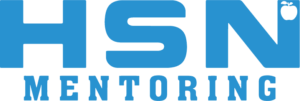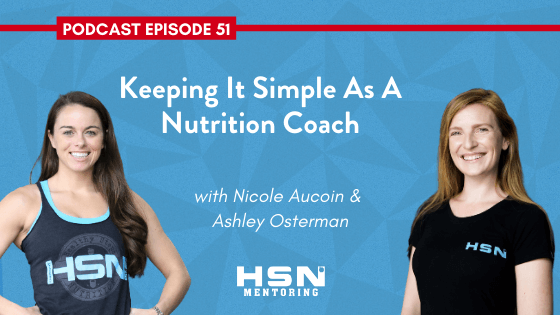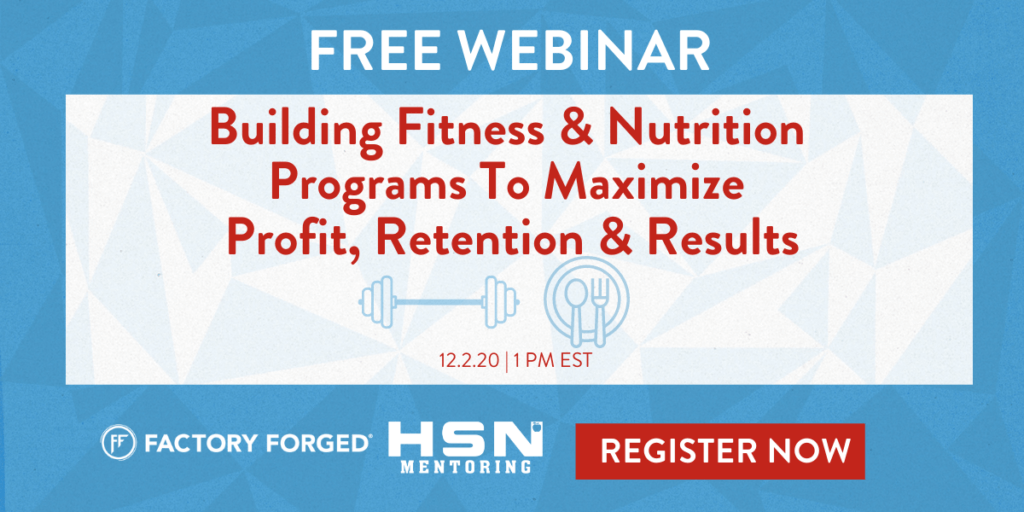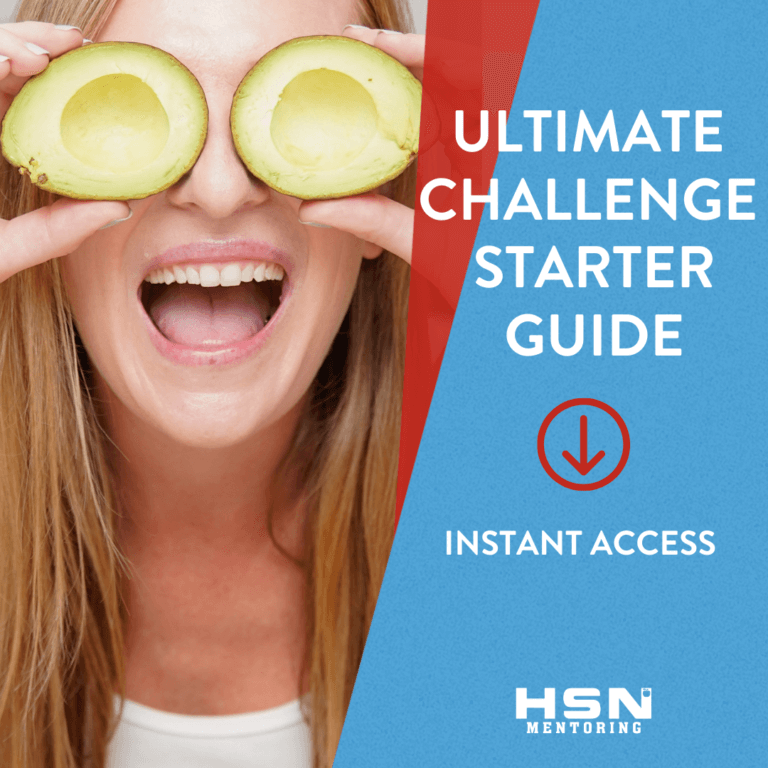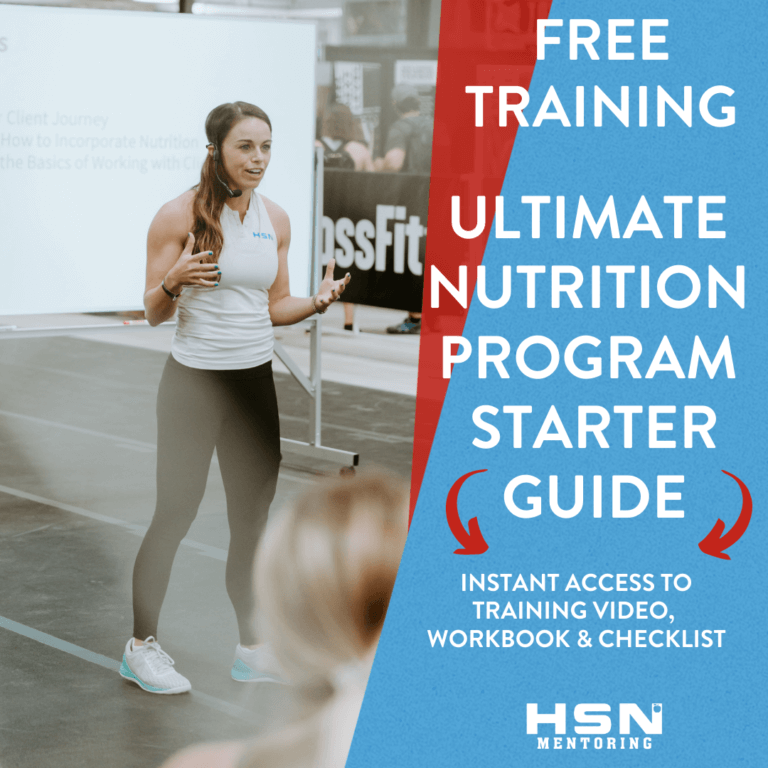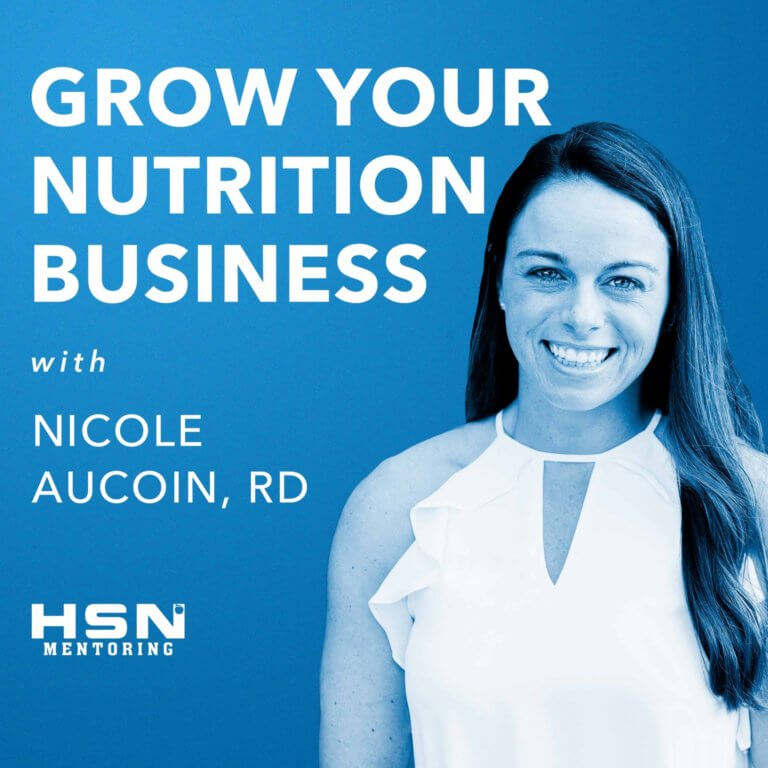Today, Ashley and I are talking about keeping it simple and how we teach nutrition coaches to keep it simple with their clients.
While this sounds easy, sometimes, you might not think you are doing enough to support your clients as a coach.
But, you must remember to keep it simple.
In this episode, we discuss:
- Why you should keep it simple?
- How to keep it simple?
- Discuss different examples when working with clients to help you apply this concept.
Podcast Episodes Related To Nutrition Coaching
What The Challenge Guide Includes:
Planning Checklist
How To Structure Your Nutrition Challenge
How To Continue Your Nutrition Program Beyond A Challenge
Additional Resources To Plan A Successful Challenge All In One Place
Episode Transcript:
Nicole Aucoin (00:02):
Welcome back to the Grow Your Nutrition Business Podcast. At Healthy Steps Nutrition, we believe something as fundamental as nutrition shouldn’t be complicated. Which is why we focus on a simple habit based approach when working with clients. We help gym owners and coaches build successful nutrition programs without reinventing the wheel. I’m your host, Nicole Aucoin, registered dietitian and founder of Healthy Steps Nutrition, CrossFit HSN, and HSN Mentoring. I’m also the author of the Basics of Nutrition Coaching standalone nutrition course, a CrossFit preferred nutrition course. I’m going to teach you how to take one step at a time to build a successful nutrition program where you finally feel confident talking about nutrition to your members and your communities.
Nicole Aucoin (00:50):
Today, Ashley and I are talking about keeping it simple. And how we teach coaches to keep it simple with their clients. This sounds easy, but sometimes you might think that you are not doing enough to support your clients as a nutrition coach.
Nicole Aucoin (01:07):
Remember, you must keep it simple. In this episode, we are going to talk about why you should keep it simple, how to keep it simple. And we give different examples when working with clients to help you apply this concept. I guarantee that if you haven’t come across the examples we discuss, you will come across them.
Nicole Aucoin (01:27):
We will get to this episode on keeping it simple just after this message. There are only five weeks left in 2020. If you are looking to overhaul and revamp your nutrition program for 2021, now is the time to be starting that conversation about nutrition beyond just a challenge. HSN Mentoring is a turnkey solution to save you time and not reinvent the wheel when it comes to building a nutrition program from scratch. HSN Mentoring starts with a training process, that includes online modules, homework, and six mentoring calls to help you apply this information with you as an owner or a dietician, nutrition coach, and the owner of your business.
Nicole Aucoin (02:12):
The training teaches you how to keep it simple when working with clients, how to set up your nutrition program, how to market your nutrition program, really how to use a habit based approach when working with clients, and retain those clients. Lastly, we discuss how to launch with a nutrition challenge and convert clients over to ongoing coaching after a challenge is over.
Nicole Aucoin (02:35):
Thousands of gyms around the world will launch nutrition challenges in 2021. The problem is their nutrition program ends at the end of a challenge. I hear it over and over again. Now is the time to revamp your nutrition program so it doesn’t end at the end of your challenge. Stephanie Allen from Sundog CrossFit just said, “I just wrapped up my training with HSN Mentoring, I have been passionate about nutrition for 30 years, but I have struggled the last eight years as a gym owner to add nutrition to my business, lack of time, not sure of the best practices, the list goes on and on. I am beyond excited to be using HSN to run my nutrition program. Nicole Marchand Aucoin has thought of everything. And it’s amazing.”
Nicole Aucoin (03:25):
“I’m kicking my program off with a challenge on the 23rd, and I have already signed up 24 people at $178 each, which is more than enough to pay the cost of the course and the mentoring plus profit. And sign up doesn’t even close until the 18th. Now I’m looking forward to working one on one with clients. Everything is done during the course. There isn’t anything that I didn’t believe, know and already tell my clients, but now I have the system and tools to get it up and running quickly. Now’s the time to be thinking about your nutrition program. So of course, use all of the free help that we provide at Grow Your Nutrition Business. But if you are looking for a turnkey solution, HSN Mentoring is the solution for you.”
Nicole Aucoin (04:16):
Enjoy this episode on keeping it simple. Ashley Osterman, welcome back to the podcast.
Ashley Osterman (04:22):
Thank you for having me, Nicole, always a pleasure.
Nicole Aucoin (04:25):
Today, we are talking about a new addition that you just added to the HSN Mentoring platform. And it’s such an important topic that we’re like, we need to make a podcast about this.
Ashley Osterman (04:33):
Yes, I definitely think keeping it simple for success is such an important tool that isn’t utilized enough with nutrition coaches.
Nicole Aucoin (04:44):
New nutrition coaches, new coaches in general have so much information. And sometimes we can overwhelm ourselves and our clients by giving out too much information at one time.
Ashley Osterman (04:54):
And your clients are already coming to you overwhelmed, Google diets, Google nutrition, Google weight loss, millions, if not billions of results, there are so many crazy diets out there. They’ve likely tried seven to 10 diets before even seeking out you as a professional to help them. The last thing you want to do is overwhelm them even more.
Nicole Aucoin (05:16):
Our mission is to empower coaches to feel confident, empower gym owners and coaches to feel confident when talking about nutrition. And really that’s your whole goal. And your main focus with our mentoring program is to empower these coaches. And one of the things that we’ve been working on for a while now is this keep it simple series.
Nicole Aucoin (05:35):
And let’s go back to why. We started it after we brought on some new coaches at our HQ location. And we’re like, you know what, they have this knowledge, but they’re not keeping it simple enough.
Ashley Osterman (05:50):
Yeah. And I think it does come down to confidence and actually practicing, because when we’re not confident as a nutrition coach, we tend to just kind of word vomit everything we know. We tend to just lean back on resources or meal plans. And we really miss out on building that personalized, customized plan for our client and their specific needs.
Nicole Aucoin (06:16):
It’s so important when we’re looking at client retention, it starts from that first meeting. And really the goal of this keep it simple series is to help coaches feel more confident by previewing some of the things that they’re likely going to see. So a lot of times what we’re doing, and we do this every week during our weekly round table, we’re bringing up different scenarios that have happened previous weeks or different things that have happened over our combined 25 years of experience as nutrition coaches and dieticians. What are some things that coaches might see? And how do you navigate it? So when it happens to you with your client, you’re like, oh, I know how to handle this, I’ve already seen this before.
Ashley Osterman (06:55):
Yeah. Real life scenarios and practical tips as well as application. Because if you’re not helping your clients apply the knowledge or apply your new habit or lifestyle or action step, you’re doing a disservice because you’re not clearly providing a path for them to be successful.
Nicole Aucoin (07:20):
We had a round table a few months ago, and Heather, one of our mentors, said, “You’re not just telling them what to do. You’re telling them the how to do it.” So when they leave your office, do they know exactly what they need to do to be successful, not just completing an action step, but how are they actually going to complete this action step?
Ashley Osterman (07:40):
Yeah. And you don’t want to miss the boat on that.
Nicole Aucoin (07:43):
That is what gets someone really good with follow through. Are they actually going to do what they said they were going to do? And if you can map out the how with the client, they’re going to leave so much more confident that they can actually do what they said they were going to do.
Ashley Osterman (07:59):
Yes.
Nicole Aucoin (08:00):
So let’s talk about one example. An example that you brought up, I think one of our first round tables, you said, “I wanted my client to start having breakfast because he ended up over-consuming later in the day because he wasn’t having breakfast.”
Ashley Osterman (08:14):
Yeah. And it might seem like such a simple action step, to have breakfast. Okay. Great, going to go have breakfast. But you can’t just leave it at there. I can’t just assume my client knows how to follow through on that action step, on that new habit of eating breakfast. I need to help him create a clear path on how to do so. So what I had my client do, which might seem very simple, which is exactly what I want it to be, is I had him go on our website and pick out a couple breakfast recipes that he would want to meal prep. What looked good to him. We picked out two recipes. Great.
Ashley Osterman (08:51):
Second step. You’re going to have to go shopping and get those ingredients for those breakfast recipes. Okay. I mean, it seems like common sense, but not everyone connects those dots of the plan to follow through with the action step. All right. Great. He went shopping. He completed that action step, that habit. Awesome.
Ashley Osterman (09:11):
Step number three. Block out time to meal prep the breakfast. And so he made a pan of egg muffins and he made some double chocolate overnight oats, one of my favorites. And he got that done. Awesome. It didn’t end there.
Ashley Osterman (09:26):
Step four. Ensure you take your breakfast with you and consume it every morning before you go to work. And I mean, that might seem a little drawn out and excessive, but that’s exactly what he needed to be able to be successful for his action step.
Nicole Aucoin (09:43):
So let’s talk about what you did there. So one of the things you did was you empowered him to make a decision to pick a balanced breakfast.
Ashley Osterman (09:52):
Yes.
Nicole Aucoin (09:52):
So we’re not saying like, okay, have breakfast. All right, there’s cereal in the pantry, there you go, you’ve had breakfast, let’s mark it off. Now, let’s move on to the next thing. No, we’re empowering him to make a healthy option for breakfast that’s balanced.
Ashley Osterman (10:05):
Yep. And easy. Because I knew he works really early and he had to grab it and eat it on the car or in the break room before his work. And that’s another thing that we need to think about too, is what potential obstacles can be in the way from our client being successful with completing their habit or their action step.
Ashley Osterman (10:22):
And one of the things for him was that he needed to have it grab and go and take with him. So I couldn’t have told him, make an omelet in the morning and let’s make some oatmeal. No, he needed something that was easy and convenient and portable to take to work. If I wouldn’t have found that out, I would have been doing him a disservice with actually being able to provide him a plan to complete that action step.
Nicole Aucoin (10:43):
One of the things that I love doing with clients is pulling up the recipe page and saying like, “Hey, what looks good to you?” And one of the things you’ve done a really good job with is add some super, super easy recipes that we can always talk about. Because there’s usually at least one recipe that’s been added every month it feels like. And that is a really great thing because then clients don’t get bored eating the same thing. And they’re constantly getting value from you because you’re sitting there going through and walking through the how to get something accomplished.
Ashley Osterman (11:13):
And I think, again, with the simple, we need to make sure that we’re giving them something simple. If your client’s not an experienced cook, doesn’t have a lot of time on their hands, I’m not going to be giving them a recipe that has seven, eight, nine steps in it. I’m going to be giving them something very simple to do because of where they’re starting out from.
Ashley Osterman (11:29):
And then making sure they’re blocking off the time to actually complete that action step. Allocating their time and energy to actually do the prepare the breakfast. And then the follow through, actually eating the breakfast, taking it with them to work. And all along the way, I had him check in with me and make sure that he was actually doing what he said he would do. But before I even let him leave the meeting, and go on with the action step, I asked him how confident he was going to be.
Nicole Aucoin (11:58):
I think asking coaches how confident they feel, or clients how confident they feel in completing something is such an important thing for you. Because then you can realize that they don’t feel confident. We need to go back. We need to change it up and switch things around so that they do feel confident that they can actually do what they said they were going to do. I actually learned that from Precision Nutrition.
Ashley Osterman (12:16):
Oh yeah, PN, such a great certification. Add some tools to the toolbox. But you need to ensure clients’ confidence.
Nicole Aucoin (12:22):
Absolutely. And the other thing that you want to ask is what potential barriers do you see coming in the way? And as an experienced nutrition coach, you’ll already see these barriers so that you can overcome them before it happens. But with new nutrition coaches, you might not see all the barriers. So asking your clients, what barriers do you see? So that you can help navigate those before they leave the office.
Ashley Osterman (12:48):
Yes, absolutely. And we do find with more experienced nutrition coaches during that initial consultation, they’re getting so much great information from digging deep with their clients. That they are able to identify potential barriers. You’re getting all that information, you’re data mining, as I like to call it, to help your clients succeed and support them in a holistic way. But with less experienced nutrition coaches or coaches who aren’t focusing on the whole client, you could be missing big pieces of the puzzle to help your clients succeed.
Nicole Aucoin (13:20):
One of the big pieces that I find newer nutrition coaches miss, and you and I both sit in with every single one of our HQ clients, HQ Nutrition coaches, we sit in and listen to how their consults go at the beginning. We’re their first test clients, I want to see. And one of the things that often gets missed is how is your support system? Who is going to support you on your journey? Are they on board with your health and wellness goals? Do they understand your why?
Nicole Aucoin (13:51):
And if you don’t ask that, it’s going to be a tougher job for you as a coach. Because if the support system of the five closest people around them are not on board, it’s going to be much tougher for them to be successful long term.
Ashley Osterman (14:05):
Yeah, we’ve seen this first hand with having long-term nutrition clients who maybe haven’t met their goals yet. They say they’re plateauing or having a hard time being consistent. But then when that significant other, when that best friend, when that family member starts making health and wellness a priority in their life, and they have that kind of built in accountability and support outside of the nutrition coach, we see progress.
Nicole Aucoin (14:30):
So much progress. And one of the things that you mentioned before, data mining during initial consults. An initial consult has to be intentional.
Ashley Osterman (14:39):
So intentional. And you as a nutrition coach should be doing about 5% to 10% of the talking. And that will be mostly asking your open-ended questions.
Nicole Aucoin (14:49):
That is so important to talk about. Because new nutrition coaches want to share all the information. Because you want to feel like you’re helping. But really you’re going to overwhelm them if you give out too much information. Your goal during an initial consult is to find out as much information as you can about the client so that you can use it later.
Ashley Osterman (15:12):
Yes. You have to spend that first initial consultation, spend the time investing in the client. What I mean is you need to dive deep, you need to ask questions, you have to start to build that rapport. I want to find places, so I can habit stack in the future, and information that I can use to support my client in the long-term. And really by doing so, and getting deep in that initial consultation, you’re setting yourself up for longer retention and better client engagement.
Nicole Aucoin (15:42):
If you are a new nutrition coach and you’re not using our platform, you really need to look at what kind of forms are you using? Are you asking all of those open-ended questions? Are you really touching base on a holistic approach? Not just asking what you ate. Or is it just an informal conversation. If you want to build a successful nutrition program, you need systems.
Ashley Osterman (16:03):
You absolutely need systems. And consistency.
Nicole Aucoin (16:06):
And that requires you figuring out what is this client experience going to look like? What questions are we asking during initial consultations? Are we asking the same questions? And if you and I are doing two different initial consults, are we going to get the same outcome? Is it going to be a similar client experience? Maybe the action steps might be slightly different, but the client experience is going to be the same.
Ashley Osterman (16:27):
Yeah. And it needs to be the same. Especially when you have multiple nutrition coaches, that experience needs to be consistent from one to the next to the next.
Nicole Aucoin (16:35):
Absolutely. That’s one of the reasons why when we bring on new gyms with HSN, we have just the owner and one coach go through the initial training. That one coach is going to be the head coach of the program. And then we will train other coaches to add and support the growth of the program. So the second coach will go through our training. Then they would shadow the first coach. That first coach would shadow them. And then they would go on and graduate and continue the process. But the other thing that we’re doing now, which is so exciting, is coaches evaluations.
Ashley Osterman (17:12):
Yes. Coaches evaluations, such a great addition to the HSN Mentoring experience, and so valuable. We find that one of the biggest things with new nutrition coaches in starting to take clients is, a little bit more practice is always great. But when we have that practice evaluation with our expert here at HSN, who is able to provide them with instant feedback, highlight bright spots, and then also show them places that they can improve upon. While also providing supportive resources to do so.
Nicole Aucoin (17:48):
When we did some polls, and we asked owners and coaches, how often are you getting evaluated as a nutrition coach? It was not enough.
Ashley Osterman (17:56):
Not enough.
Nicole Aucoin (17:57):
It wasn’t happening at all really. And how are you going to improve if you’re not being evaluated? And I think as a gym owner, we’re really good at evaluating coaches, like our CrossFit coaches, but the nutrition coaches are not getting evaluated.
Nicole Aucoin (18:10):
And if they’re not investing in themselves and you’re not having that growth mindset, your program is going to hit a plateau. You have to get more tools in your toolbox. You have to be constantly on this mission to become better and grow as a coach.
Nicole Aucoin (18:25):
Coaches evaluations are a really great way to do that. We’re incorporating the coaches evaluations with every new nutrition coach being added to the platform. Any new gym that’s coming through the training process. There’s now six mentoring calls, that sixth call is the coaches evaluation call.
Nicole Aucoin (18:42):
The cool thing is, is after that evaluation, you’re getting an email, the owner and the coach, with all the awesome things, some things to improve on, and then the resources to help you improve on those things that you need to work on.
Nicole Aucoin (18:55):
Existing coaches can also purchase an evaluation so that they can get that instant feedback as well. And you know what, we want coaches, if they don’t want us to do the evaluation for them, that is totally okay, we have the rubric laid out for gym owners to do the evaluations themselves.
Ashley Osterman (19:15):
Yeah. Or for those gyms that have multiple nutrition coaches, have them do it on each other. We have the whole rubric, everything that we grade on is available for our mentoring clients in the Grow Your Nutrition Business platform.
Nicole Aucoin (19:27):
I love that, the keeping it simple series is so cool, because what we’re seeing, especially during these weekly round tables, is gym owners and coaches getting involved in the conversations. “Hey, I had this happen. How would you navigate this? What would you do in this scenario? What would you do in this case?” And the cool thing is, is that situation has not only happened with one coach, it’s happened with multiple coaches.
Ashley Osterman (19:50):
Of course, of course, if it’s happened one place, it’s definitely happened in another place. Or might happen to you in the future.
Nicole Aucoin (19:56):
And when it does happen, you’re going to feel so much more confident if you’ve seen how you should handle that situation.
Ashley Osterman (20:03):
Yeah. You kind of have a plan of action.
Nicole Aucoin (20:05):
I love this keep it simple series. This is so fun because it’s ongoing. We release this course where we’re talking about the why, why should we keep it simple?
Ashley Osterman (20:16):
Yeah. Talk about the why, we’re talking about how. How coaches can keep it simple. We’re also talking about why mindset and the holistic approach matters. And how to overcome obstacles in advance, as well as those practical tips and application and those real life examples to help you when you have a similar situation.
Nicole Aucoin (20:35):
Ashley, I think so many people come to us wanting a meal plan or wanting a super restrictive diet because we live in this microwave society where we want everything yesterday. And we think that if we do more, we’re going to achieve more.
Ashley Osterman (20:49):
Yeah, it’s so common. And think about it as a coach or an owner, do you guys have a consistent message when you get a call or an inquiry about a meal plan or you get a call about trying to do keto or macro or whatever the newest fad diet is out there? Is there a consistent message explaining your program and what the client can expect while doing your program?
Nicole Aucoin (21:13):
The truth is, we understand people are coming to us asking all of those questions, but what they really need is they need something that’s simple and actionable.
Ashley Osterman (21:20):
They do.
Nicole Aucoin (21:20):
What my recommendation would be, is to have that consistent message, hey, I understand you want a meal plan. I get it. But I don’t want you to feel like you have to follow a piece of paper to be successful. Here’s how it works with our program. We’re going to sit down with you. We’re going to find out all the information about you, what you’re doing now, what’s worked well for you now. What’s worked well for you in the past, what hasn’t worked well. And then we’re going to create a customized plan for you.
Nicole Aucoin (21:45):
We actually have a nutrition coaching program, that’s a 12 week commitment, because I don’t want you to feel … I don’t want to feel like I have to tell you everything right now. And then you feel overwhelmed. How many times have you tried a diet and changed everything, and then regained the weight that you worked really hard to lose?
Ashley Osterman (22:00):
Yeah, because we know that’s not sustainable.
Nicole Aucoin (22:02):
And I usually sit there and I’m quiet because I know that they have tried something. The statistics show people will try at least seven to 10 diets before seeking a professional. So I know they’ve tried something. And I’m just [inaudible 00:22:15]. And they say, “Yeah, I’ve definitely …” Or “Have you done a challenge before and then regained the weight after that challenge because you did too much at one time?” “Yep.”
Nicole Aucoin (22:23):
And then I say, “You know what, our clients tell us that it’s too easy.” “Are you sure? Are you sure? That’s all you want me to do this? This sounds too easy.” And when they tell me that, I know that we’re on the right track. Because I want them to feel a thousand percent confident that they can do what they say they’re going to do when they leave the office.
Nicole Aucoin (22:41):
And we’re just going to work on one thing at a time. And once you nail that one thing, I’m going to add the next thing to your plate. And the next thing, and the next thing. Instead of trying to change too much at one time. Because the research shows, if you try to just change one thing at a time, your clients are going to be 80% successful.
Ashley Osterman (22:56):
And it’s sustainable for over a year. But then when we start adding more things to the plate, I think it’s what? Three. It goes down to less than 5% chance of success and sustainability over a year.
Nicole Aucoin (23:08):
So, if you add two or more things, it’s less than 5%. And three things, less than 3%.
Ashley Osterman (23:13):
Yeah, it is.
Nicole Aucoin (23:13):
And that is so common. You think about it, and a client comes in, and let’s say, they’ve never meal prepped before. And then you tell them, you need to cook everything that they put in their mouth. They can no longer eat out. And they need to track their macros.
Ashley Osterman (23:32):
That’s overwhelming.
Nicole Aucoin (23:33):
A million things. Even just tracking macros is super overwhelming for most people. But if I say to a client, who eats out every day, I say, “All right, I just want you to have two fists of vegetables for lunch and dinner every day.” That’s it.
Ashley Osterman (23:47):
It doesn’t seem as overwhelming. That seems achievable.
Nicole Aucoin (23:50):
And what do I mean by that? Then I say, “Is that doable? Do you think you can do that?” “Oh, maybe, maybe not, I don’t really have a way to heat up vegetables for lunch. I don’t have a way to heat up my lunch.” “Okay. Could you cut up raw peppers?” Now we’re talking about the how, going back to keep it simple series. “Could you cut up a bag of raw peppers, five bags, and put one bag in your lunch that you bring with you to work every day?” “Okay. Yeah, I can do that. That seems pretty easy.” “Awesome. All right, let’s do that. And then you’re going to come back to me. We’re going to check in at the end of this week through the HSN app, and we’re going to navigate what the next thing that we’re going to work on is.”
Nicole Aucoin (24:27):
But I’m not going to overwhelm them with too much information at one time. And this whole keep it simple series is really about not overwhelming clients. And helping them feel more confident.
Ashley Osterman (24:39):
Yeah. And Nicole, you really hit the nail on the head there, with the peppers and how to cut them up and make bags and put them in their lunch. Because you have to provide them with a clear and simple plan for success. We find that the more simple that you can make it for your clients, the more success they will find. And we know that the more successful a client is, the more motivated they are to continue.
Nicole Aucoin (24:59):
When we talk about keeping it simple, it’s great, you have to have that plan, but then you have to have a way to keep them accountable to that plan. And that’s where I find that a lot of programs are missing the mark. Because they don’t have a way to keep their clients accountable.
Ashley Osterman (25:13):
They don’t have a system in place. They don’t have a specific avenue to keep them all accountable. And I think that’s one of the greatest things about the HSN app is that it’s a one stop shop to ensure that our clients are being consistent. They are doing what they said they would do. And we have a place to communicate. So that way they’re not emailing me and texting me and Facebook messaging me because that can get super overwhelming for a coach too.
Nicole Aucoin (25:40):
When we talk to new coaches that don’t have a system in place, they say that they feel overwhelmed after 5/10 clients. The problem is there are so many more people that need help besides 5/10 people.
Ashley Osterman (25:52):
And you could help so many more if you had that streamlined process and system.
Nicole Aucoin (25:57):
Absolutely. I want to go back to the initial consult because I think this is so important. Then we’ll wrap this thing up. We talk about digging deep, and we talk about having an initial consult form. What’s something that you see during initial consults that coaches forget?
Ashley Osterman (26:15):
I really think talking about the holistic approach is a piece that’s overlooked. The support system is so important, asking them about their stress level, how they manage their stress. Because-
Nicole Aucoin (26:28):
I was hoping that you would say that. Managing stress is so important.
Ashley Osterman (26:32):
So important. Yeah. Because when we start to talk about people who have a high stress level or in a period of their life where it’s a little bit more stressful, a lot of times we find that eating mindlessly can be one of those stress relievers in the moment. They can turn to food for comfort. They can turn to food for that instant gratification.
Ashley Osterman (26:56):
But then when we start talking about how they feel afterwards, it’s not always the greatest thing. So making sure we can find a way for them to mindfully manage their stress. And help divert those undesirable habits for managing stress with food.
Nicole Aucoin (27:14):
So in October, our ongoing educational webinar for our mentoring clients was five tips for helping clients navigate the holidays. And one of the things that we asked our coaches, do you know how every single one of your clients-
Ashley Osterman (27:30):
Because you should. Because you should.
Nicole Aucoin (27:31):
[crosstalk 00:27:31] stress. Because the holidays are historically a stressful season for a lot of people, on top of a pandemic, on top of kids, may or may not going back to school. And now you’re playing all of these roles as a parent.
Nicole Aucoin (27:47):
There’s so many things that are causing stress. Do you know how your clients manage stress? And if they manage stress with food, have you helped them navigate another way to manage their stress? You’re looking at a holistic approach with lifestyle, support, sleep, stress, exercise, and nutrition. Looking at all of those things really is going to help you provide your client with support for the whole person.
Ashley Osterman (28:14):
And that’s why it’s so important when you’re doing that initial consultation, that you really talk about the holistic approach. You get all of the information you need to support your client in the long-term.
Nicole Aucoin (28:26):
If you are an HSN mentoring client, make sure that you check out the keep it simple for success series. We’re so excited about this. And every single week on our round tables, we’re bringing up even more scenarios.
Ashley Osterman (28:39):
Yeah, bring your questions. And we’re here to provide you with so much additional support.
Nicole Aucoin (28:44):
Thanks, Ashley.
Nicole Aucoin (28:46):
Keeping it simple is harder than it seems. You must be really intentional and meet your clients where they’re at to avoid them feeling overwhelmed. I feel like the more education you have and knowledge about nutrition, the harder it is to do this. But creating systems and forms will allow you to help keep it simple. Writing everything down, and then just circling that one thing that would be a good starting point when working with your clients.
Nicole Aucoin (29:17):
Don’t forget, you want to give them the autonomy to help create the plan themselves. Not just you telling them what to do. By taking those good notes, you can always refer back to them to help create the next steps when creating a plan with your client.
Nicole Aucoin (29:31):
As a coach, it can be tough sometimes because we live in a society where everyone is all or nothing. People think that if they change everything today, they will see results tomorrow. And instead we have to help them understand that that doesn’t work. And let’s do an experiment for four to six weeks to see how you feel when we try it my way. By that time, after four to six weeks, they should realize that keeping it simple is actually sustainable.
Nicole Aucoin (30:00):
To keep it simple, you must understand how to set up pricing and packages to build in enough time to keep it simple, so your clients actually see results. This is why we recommend a 12 week initial commitment. For more support on setting up pricing and packages, please click the link in the show notes.
Nicole Aucoin (30:19):
I hope you enjoyed this episode. Also, please don’t forget to rate our podcasts and leave a comment or a review. Take a screenshot of that comment, then send it to podcast at healthystepsnutrition.com. And we will send you a starter guide and bundle to help save you time and not reinvent the wheel when it comes to building your nutrition program. Until next week.
